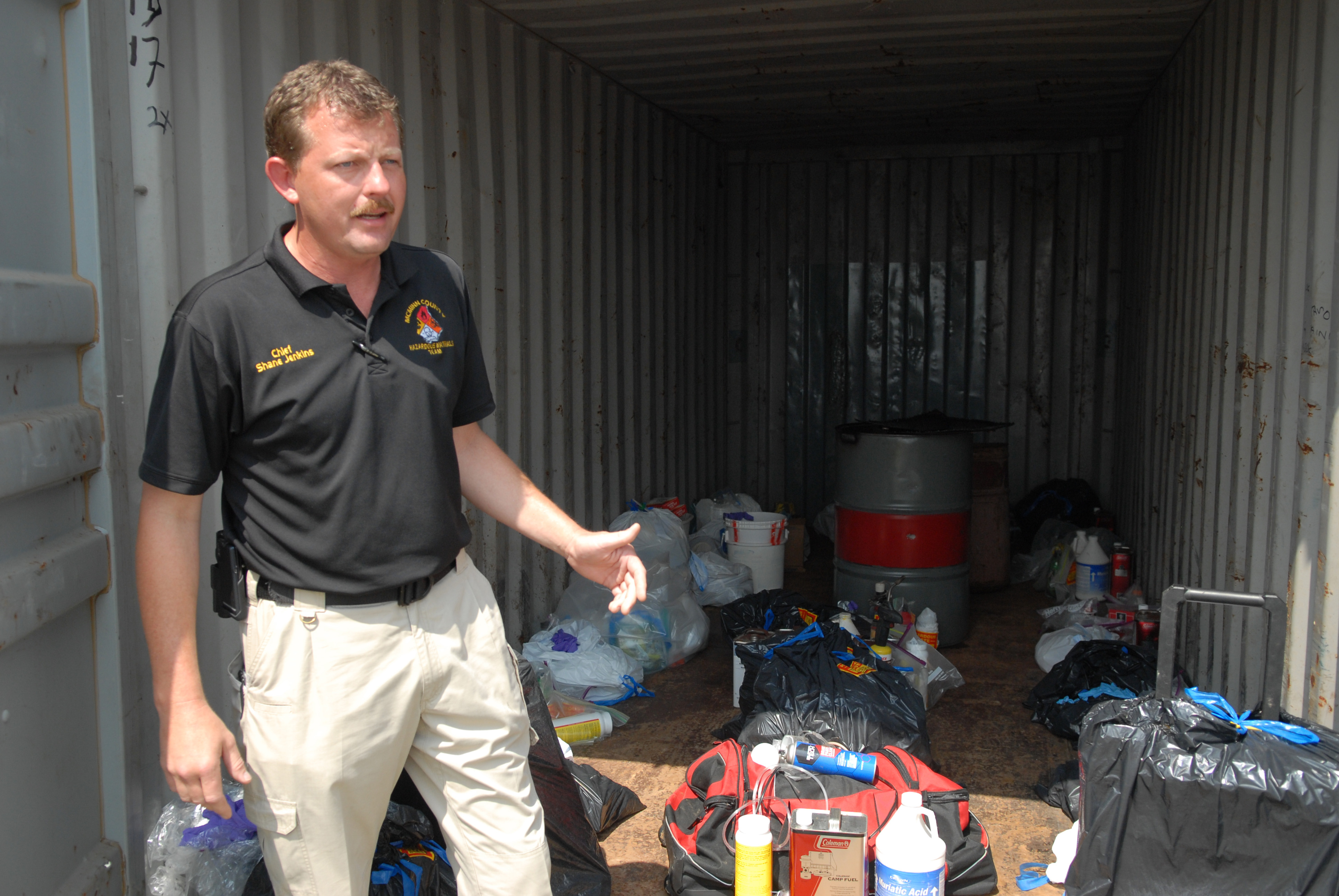When federal funding for meth lab cleanup suddenly was cut this year, McMinn County Sheriff Joe Guy was afraid he'd get a call that a lab exploded or was found somewhere in the county.
"We were holding our breath," Guy said.
Before February, whenever a meth operation was uncovered, Guy would call the U.S. Drug Enforcement Administration to package and dispose of the lab's toxic waste, a job that cost the county nothing. But with federal dollars gone, he had to figure out how to produce the money - $2,500 to $5,000 per lab - or create a new plan.
Because McMinn County led the state in 2010 with the highest number of raided meth labs -161 - Guy had to find a solution quick.
One of his employees heard about an idea that would slice the cleanup cost by nearly 90 percent after the initial purchases were made. Guy purchased a large bin to serve as a storage unit for meth lab contents. The county's hazardous materials team, which works voluntarily, now takes materials collected in cleanups to this bin.
But McMinn County officials didn't know the Tennessee Meth Task Force was working on the same idea for the entire state.
Since February, the task force has been working on a storage container program that would allow multiple agencies to store the toxic remains from dismantled meth labs once the contents have been packaged properly, task force Director Tommy Farmer said.
About 11 bins will be placed in secured sites across the state - including one at the TBI headquarters in Memphis, another in Knoxville - so many agencies can have easy access, he said. About once a month, or when the bins are filled, a meth task force truck will clear the bins.
The program is being funded through state appropriations and a separate federal grant that Gov. Bill Haslam made available to the Tennessee Bureau of Investigation to assist in meth lab cleanup. Combined, the money totals about $1 million.
The task force also is working on a training program to equip lab technicians with the expertise to clean the labs without federal help, then take the leftovers to the nearest storage bin, Farmer said. Most law enforcement agencies already have lab technicians, so training will be minimal.
Overall, the program could save about $3.5 million of the $4.1 million annual cost in meth lab cleanup statewide, he said.
"We should have been doing this a long time ago," said Sequatchie County Sheriff Ronnie Hitchcock.
Farmer said plans have been in the works for two years, but the sudden loss of federal funding helped everyone agree quickly on how to implement such a program.
"We just weren't able to get everybody at the table to get the program [started]," he said.
After the Meth Task Force was given the green light to start the program statewide, agents purchased five unused containers on military bases, Farmer said.
But several of the containers were rusted and needed to be refurbished, Farmer said.
The Sequatchie County Sheriff's Office was asked to clean the bins using its inmate program, the sheriff said. Inmates sanded, cleaned and repainted all the bins last week, Hitchcock said.
The bins now are ready to be distributed across the state and stored at sites with 24-hour supervision and security cameras, Farmer said.
The six other bins already have been purchased by different sheriff's offices and the task force worked out an agreement to share them across the state - including one in Hamilton County, Farmer said.
For the program to work, each area must have a lab technician who is trained to dismantle the labs, and that's where the new training comes in, he said.
Already, 60 lab technicians are being trained, and a program is going to be offered at the state's Fire Service and Code Enforcement Academy in Bell Buckle, Tenn., for more lab technicians, he said.
"There is adequate coverage for the state," Farmer said.
"It's a big relief," Hitchcock said. "[The cleanup cost] would hurt any county, but it would really hurt the little counties."
Meanwhile, the North Georgia counties that border Chattanooga also will benefit.
The Lookout Mountain Judicial Circuit Drug Task Force - which covers Catoosa, Walker and Dade counties - already has purchased a storage bin to be part of the program, said task force Deputy Cmdr. Patrick Doyle.
The Lookout Mountain drug task force agents also will be able to train in Tennessee, which Farmer said, "makes very good sense."
"If we have the resources, we can share with them," he said.
Since federal funds were cut, the Lookout Mountain Judicial Task Force has had to pull from its operating budget to pay for the cleanup of 13 meth labs found in the area, Doyle said.
"That's a lot of money when you're talking about $2,000 apiece," he said. "I think [now] we're going to get a fraction of the cost."
Contact Joy Lukachick at jlukachick@timesfreepress.com or 423-757-6659.
